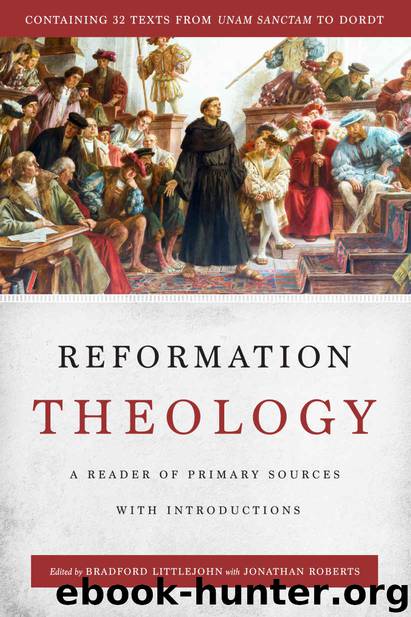Reformation Theology by Littlejohn Bradford

Author:Littlejohn, Bradford
Language: eng
Format: epub
Publisher: UNKNOWN
Published: 2018-01-04T05:00:00+00:00
INTRODUCTION TO THE COUNCIL OF TRENT’S DECREE ON JUSTIFICATION
BY JUST a couple of years into the Reformation, Luther had appealed his cause to a General Council of the Church. And although there were many in Rome who preferred to silence him by papal fiat or imperial force, his call for a Council found sympathetic ears throughout Christendom. Not only was the memory of the reforming councils of the previous century still relatively fresh, but it was clear to the majority of church leaders that Luther had gained such a large following because there was more than a kernel of truth in his denunciations of the Roman Church. Corruptions of both doctrine and practice were rife. Even many staunch traditionalists welcomed a council if it meant an opportunity to crystallize once and for all disputed and ambiguous Catholic teachings.
However, the interminable three-way political squabbles (and intermittent all-out wars) between the Pope, the French king Francis and Emperor Charles V delayed a council over and over. An abortive effort at Mantua in 1537 almost materialized, but soon dissolved. Meanwhile, remarkable reforming energies began to be felt within Italy itself, the heart of the Catholic Church. Moved partly by reading translations of Luther’s writings and partly by their own religious experiences and reflections on the Augustinian legacy of the medieval Church, many prominent Italian churchmen came to views not too distant from Luther’s doctrine of justification. When one of them, Gasparo Contarini (1483–1542), was chosen as papal representative to a conference with Protestant leaders, including Melanchthon and Bucer, at Regensburg in 1541, hopes were accordingly high for some sort of settlement. The Colloquy backfired, however, as Contarini’s willingness to make concessions confirmed the suspicions of hardline traditionalists in Rome, leading to the arrest of Contarini and the launch of the Roman Inquisition in 1542.
It was thus in a climate exceedingly unfavorable to any concessions that a Council was at last convened at Trent after further negotiations, arguments, and delays in 1545. But though the Pope had obtained the grudging support of Charles for the Council, Francis still opposed it, and it was hardly the great General Council of Christendom that had been hoped for or that the moment required. Only a few dozen of the 600 bishops invited appeared, and almost all of them from Italy. Reform-minded bishops from Germany and France generally kept a wary distance, as did Protestant leaders.
This did not mean that no significant reforms were undertaken by the Council; on the contrary, it saw many important changes to the Church, including a purging of many of the worldly corruptions of the clergy that had made the church such a laughingstock to men like Erasmus and had earned Luther such a wide hearing. But the purpose of these reforms was to shore up the authority of the church, and when it came to doctrine, the result of the Council was to render the gap between Rome and Protestantism unbridgeable. To be sure, Trent condemned some of the more seriously aberrant
Download
This site does not store any files on its server. We only index and link to content provided by other sites. Please contact the content providers to delete copyright contents if any and email us, we'll remove relevant links or contents immediately.
The Hatha Yoga Pradipika (Translated) by Svatmarama(2475)
Real Sex by Lauren F. Winner(2466)
The Holy Spirit by Billy Graham(2406)
The Secret Power of Speaking God's Word by Joyce Meyer(2246)
The Gnostic Gospels by Pagels Elaine(2021)
Devil, The by Almond Philip C(1895)
23:27 by H. L. Roberts(1889)
Jesus by Paul Johnson(1881)
The Nativity by Geza Vermes(1845)
All Things New by John Eldredge(1777)
Chosen by God by R. C. Sproul(1754)
Angels of God: The Bible, the Church and the Heavenly Hosts by Mike Aquilina(1624)
The Return of the Gods by Erich von Daniken(1568)
Angels by Billy Graham(1543)
Evidence of the Afterlife by Jeffrey Long(1457)
Knowing God by J.I. Packer(1428)
The Gnostic Gospel of St. Thomas by Tau Malachi(1406)
Victorian Sensation by James A. Secord(1403)
How To Be Born Again by Billy Graham(1400)
